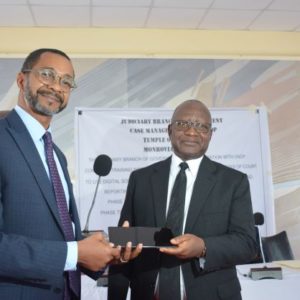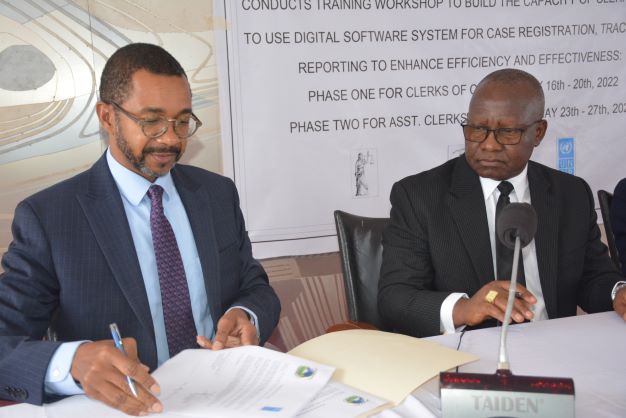By His Honor Francis Korkpor Sr., the recently retired Chief Justice, Supreme Court of Liberia, and Stephen Rodriques, UNDP Liberia, Resident Representative
Monrovia, Liberia; 03 October 2022- Civil wars destroy many things – human lives, relationships, properties, and institutions. At the end of Liberia’s civil conflict, the justice sector was decimated. Hundreds, if not thousands, of qualified judicial personnel had fled the country or had opted for private legal practice.
Much of the country’s judicial infrastructure – the physical premises of courts, tribunals, lawyers’ chambers, desks, chairs, computer systems, and so on – were either destroyed or looted. Recognizing the importance of quickly reestablishing the Rule of Law, the new Administration, with support from the UN Mission in Liberia and other partners, prioritized judicial reforms, the rehabilitation and construction of additional court facilities, and training and deployment of justice and security actors including judges, city solicitors, public defenders, prosecutors, police, and immigration officers. This was a mammoth task for the country, but it provided an opportunity to build back better and to introduce much needed judicial reforms while extending justice services to remote areas where such services were almost nonexistent prior to the conflict.
UNDP was one of the earliest partners to join hands with the Government and the Judiciary to work on rebuilding the sector. Other partners came along and our collective efforts have led to a visible transformation of the justice sector and increased access to justice in a number of respects.

First, over the past decade there has been a substantial enhancement of the capacity of sitting magistrates. Magisterial courts are often the first line of contact between the Judiciary and the public. This is where ordinary citizens go to seek justice. These courts were, however, impeded from properly performing their functions due to limited capacity – most magistrates presiding over the courts did not possess university or law degrees. There was a need to increase the number of qualified magistrates. This was addressed by the training of new professional magistrates while the skills of existing magistrates were upgraded. At least 300 magistrates were trained through successive thirteen-month intensive trainings at the James A. A. Pierre Judicial Institute. Several of these magistrates were deployed in remote areas where they are providing quality justice services to people. These services were previously unavailable in these remote areas.
Second, in order to enhance the provision of legal aid services especially in the rural areas, the Judiciary has established a public defenders’ system. Dozens of public defenders have been trained and deployed especially in rural areas. UNDP has been a part of this journey, in line with its developmental mandate of empowering the poor and disadvantaged and providing access to justice for those who would otherwise be excluded. Currently, public defenders have been institutionalized as part of the criminal justice system and regularly
provide legal aid services to indigent Liberians. This assists the most vulnerable in society to have access to justice.
Third, after the civil conflict, Liberia witnessed increased numbers of sexual and gender-based violence (SGBV). Unfortunately, these cases also remained largely unaddressed since they had to compete with other serious cases on the courts’ overcrowded dockets such as murder and manslaughter. This deprived survivors of SGBV, who are mostly poor women and children, of legal redress, while the perpetrators carried on with impunity. In partnership with UNDP, and with support from other development partners such as the Embassy of Sweden and Embassy of Ireland, specialized criminal Courts E were established in Monrovia, Bong County and Nimba counties to deal solely with cases of sexual related violence. These courts provide specialized and fast track services in the determination of cases. In addition, specialized investigative and prosecutorial units were established at the Liberia National Police and Ministry of Justice, with the sole purpose of investigating and prosecuting SGBV cases. Since their establishment, the SGBV Courts E have registered 2,261 cases and disposed of 865.
Fourth, Liberia’s prison population far exceeds the prison capacity. This has resulted in prison overpopulation. Most of those in prison are pre-trial detainees who have no means of posting bail. They are often poor persons, and their absence is overlooked by society. To address this situation, a Magisterial Sitting Programme was established by the Judiciary, in collaboration with UNDP. Through this Programme, the Judiciary assigns magistrates to conduct court proceedings in prison facilities. This enables the courts to identify, through the prison records, inmates that have been incarcerated more than the statutorily permitted period and ensure their release. Again, justice for the poor.
Fifth, due to the large-scale destruction of court houses during the civil conflict, the Judiciary prioritized the construction and rehabilitation of court infrastructure. Through national resources and with support from development partners, the Judiciary has constructed at least 12 courts in the past 10 years in the remote areas of Liberia, thereby taking justice to the people. These courts have increased access to justice by reducing travel time and prohibitive costs that litigants often incur to travel over long distances to court premises to seek redress. With justice services being closer at hand, citizens can have their cases resolved peacefully and amicably by the justice system, without resorting to extra-judicial measures. The presence of justice sector institutions such as the Judiciary, police and prisons in localities serve to also deter and reduce criminal behavior as communities are able to witness the law in action and interact with justice sector actors. This increases public trust in the Judiciary.
Sixth, for decades the Judiciary has used costly and inefficient manual systems of filing cases and keeping records, while in other parts of the world the justice sector has been harnessing the potential of digital tools. This year, the Judiciary, also in collaboration with UNDP, embraced modern, digital tools and implemented an online case management system.
This has transformed the tracking of cases from a manual to an online system. Consequently, data on the progress of cases are readily accessible, and the Judiciary does not have to wait till the end of court terms to compile reports. This system will enable the Judiciary to monitor overcrowded court dockets and prison facilities to ensure that remedial measures are taken.
Finally, while the Judiciary has made progress in Liberia’s post conflict years, the institution requires increased budgetary provision to sustain and improve its services. More resources are needed to extend its reach throughout the country through the construction of courts and expanding the role of the Magisterial Sitting Programme. A peaceful and prosperous Liberia can only be guaranteed if there is respect for the rule of law. Much of what has been achieved today with regards to the transformation of the Justice Sector came through partnership and collaboration.
This has enabled Liberia to adopt modern reforms and develop stronger, robust and efficient justice to meet the needs of everyone in society. Today, there is increased access to quality justice, including for the poorest members of society. The progress catalogued is but the start of a journey; the work is unfinished. Over the coming years, and as the Judiciary transitions into a new era, we must continue to strengthen justice institutions, enhance trust with communities, while creating an enabling environment for a safer, more secure and more prosperous Liberia.

